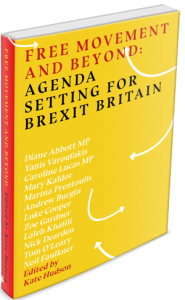It is time for the left to seize the debate on immigration and assert a counter narrative that is fact-based, positive and progressive.
Diane Abbott MP’s introduction to the pamphlet: Why immigration is good for all of us.
This pamphlet sets out some of the facts about immigration. There are so many urban myths swirling around the subject that there will be those who are surprised to learn that some commonly repeated narratives about immigrants are actually false. For instance, even on the government’s own estimates, overseas immigrants currently account for only 0.1% of total NHS expenditure. Far from being a drain on the NHS, without immigrant health workers it would collapse.Unfortunately some argue that, even if you explain the facts, it is impossible to defeat the current anti-immigrant tide in British politics. This is extra-ordinary defeatism. On that basis we would not have seen any of the advances in social policy that have occurred over the last century. You do not get political advance by studying opinion polls and then echoing the public’s prejudices back to them. Every major social advance had to be campaigned for, often in the face of a hostile media.
It is time for the left to seize the debate on immigration and assert a counter narrative that is fact-based, positive and progressive about multi-cultural Britain. In 2012 the opening ceremony of the London Olympics was a compelling and electrifying celebration of multi-cultural Britain. It was widely praised. We need a political narrative that matches the artistic narrative of Danny Boyle.
We also need to understand the historical context of the current debate. Nothing that is being said in the current debate on immigration is new. Each new wave of immigrants has been subject to the same complaints, often focussed on labour market issues. And, for over a century, immigration has been code in the British political discourse for race.
Anti-Irish racism was common in Victorian England. The Irish were routinely portrayed in cartoons in Punch and elsewhere as having ape-like features, signalling the racial antipathy. Irish workers were accused of driving down wages and monopolising certain, low paid, job markets. In 1870 Marx wrote “Every industrial and commercial centre in England now possesses a working class divided into two hostile camps, English proletarians and Irish proletarians. The ordinary English worker hates the Irish worker as a competitor who lowers his standard of life. This antagonism is artificially kept alive and intensified by the press, the pulpit, the comic papers, in short, by all the means at the disposal of the ruling classes”
Later in the century Russian Jews fleeing persecution in Tsarist Russia came to Britain in their tens of thousands. They settled in cities like Manchester and Leeds, but above all they came to the East End of London. There were over 200,000 Jews in London by 1914. They were met with bitter hostility, including from some trade unionists. They were seen as competing for homes and work in an economy which was in recession. They were accused of being willing to work for longer hours in poorer working conditions at a lower wage than their British co-worker, thereby underselling the indigenous workforce. In 1905 the Manchester Chronicle wrote “the dirty, destitute, diseased, verminous and criminal foreigner, who dumps himself on our soil and rates simultaneously, shall be forbidden to land”.
In the years after the Second World War immigration from the West Indies triggered the, now predictable, complaints about housing problems and labour market issues. These complaints were often from people whose concern for the British working man and woman had been well concealed until then. So in 1954 the Conservative MP for Louth, Cyril Osborne asked the Prime Minister “What is Her Majesty’s government’s policy regarding…the immigration into this country of coloured people without tests of either health, technical skills or criminal record…in view of the recent increase in unemployment” But the advent of the welfare state meant a new set of complaints about immigrants. Labour and Conservative MPs complained that immigrants were adding to the housing problem, increasing the size of school classes and swelling demands on National Assistance (i.e. the benefits system)
So there is nothing new under the sun when it comes to the anti-immigrant narrative. And it is vital to separate reality from myth in the current debate on the subject. This is partly because it would be unjust to do anything else. But it is also because making immigrants the scapegoats for current economic conditions is a damaging diversion from formulating the policies which will address the real problems of British workers black and white.
Immigrants are not the cause of low wages. Predatory employers, deregulated labour markets and the diminution of trade union rights and freedoms are the underlying causes of low wages and labour market insecurity. Progressives have to turn people’s attention to the real cause of their discontents. This pamphlet gives us some of the facts we need to do just that.
 Diane Abbott is a contributor to Free Movement and Beyond: Agenda Setting for Brexit Britain. She will be speaking at the book launch on 27 March 2017. Details and registration here…
Diane Abbott is a contributor to Free Movement and Beyond: Agenda Setting for Brexit Britain. She will be speaking at the book launch on 27 March 2017. Details and registration here…

